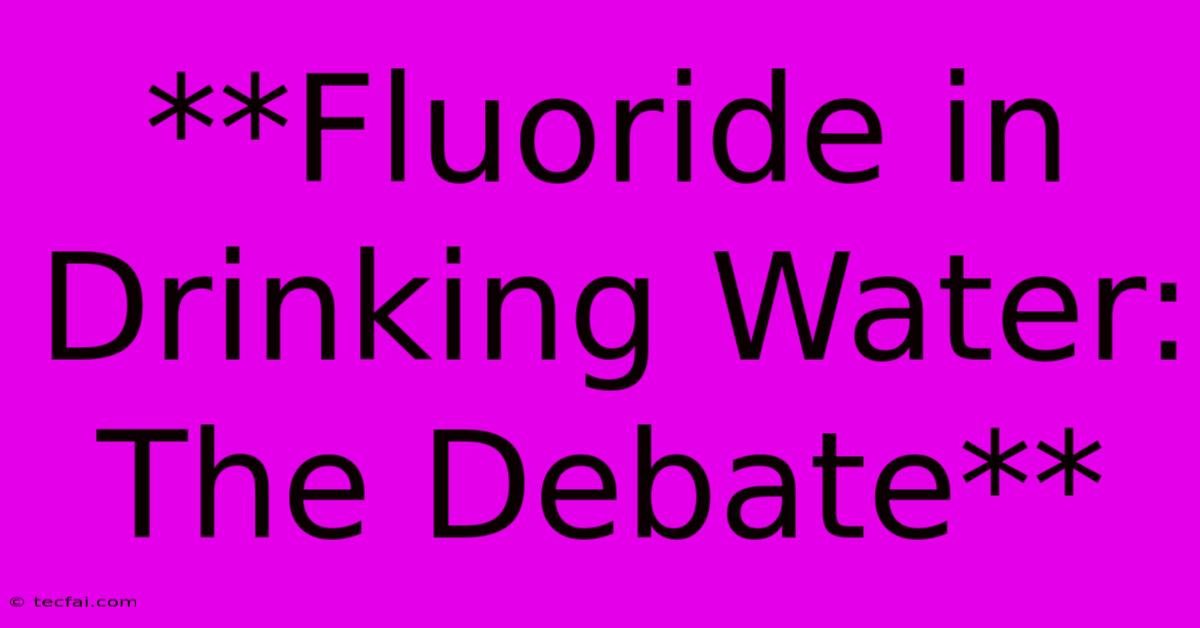**Fluoride In Drinking Water: The Debate**

Discover more detailed and exciting information on our website. Click the link below to start your adventure: Visit Best Website tecfai.com. Don't miss out!
Table of Contents
Fluoride in Drinking Water: The Debate
The addition of fluoride to public drinking water has been a topic of debate for decades. While some consider it a public health success story, others express concerns about its safety and efficacy. This article explores both sides of the argument, examining the benefits, risks, and ethical considerations surrounding fluoride in drinking water.
The Case for Fluoridation:
Preventing Tooth Decay: The primary argument in favor of fluoridation is its ability to significantly reduce tooth decay, particularly in children. Fluoride strengthens tooth enamel, making it more resistant to acid attacks from bacteria and sugar. Studies have shown that fluoridated communities experience a significant reduction in dental cavities compared to those without fluoridation.
Public Health Initiative: Proponents of fluoridation argue that it's an effective and affordable public health measure. It provides broad access to fluoride, benefitting those who may not have the resources or access to other forms of fluoride, such as toothpaste or mouthwash.
Low Concentrations: The amount of fluoride added to drinking water is generally low and considered safe by health authorities. It's important to note that the concentration of fluoride in water is significantly lower than that found in commercially available fluoride toothpaste.
Concerns Regarding Fluoridation:
Fluorosis: While beneficial in small quantities, excessive fluoride intake can lead to dental fluorosis, a cosmetic condition that causes white or brown spots on teeth. This can be a concern, especially in areas with naturally high fluoride levels in water or where individuals consume excessive amounts of fluoride supplements.
Other Health Risks: Some individuals raise concerns about potential links between fluoridation and other health issues, such as bone fractures, thyroid dysfunction, and cancer. However, these claims have been largely refuted by scientific research.
Ethical Considerations: There are also ethical concerns about fluoridation, including the lack of informed consent from individuals regarding the addition of a substance to their drinking water. Some argue that the decision to fluoridate should be left to individual communities.
The Ongoing Debate:
Despite decades of research and debate, the issue of fluoridation remains controversial. While the scientific evidence overwhelmingly supports the benefits of fluoride in preventing tooth decay, concerns regarding potential risks and ethical considerations continue to fuel the debate.
The Future of Fluoridation: The decision to fluoridate or not remains a local one, with individual communities deciding based on their own assessments of the risks and benefits. It's crucial for communities to engage in open and informed discussions about fluoridation, considering the available evidence and the needs of their population.
Ultimately, the decision about fluoride in drinking water is a complex one with no easy answers. By understanding both sides of the argument, individuals can make informed decisions about their own health and advocate for policies that best serve their community.

Thank you for visiting our website wich cover about **Fluoride In Drinking Water: The Debate**. We hope the information provided has been useful to you. Feel free to contact us if you have any questions or need further assistance. See you next time and dont miss to bookmark.
Featured Posts
-
Ton Conference Did Durov Attend
Nov 05, 2024
-
Nyt Tech Workers Demand Fair Contracts
Nov 05, 2024
-
Panuorin Ang Clippers Vs Spurs
Nov 05, 2024
-
Champions League Projections Key Fixtures Ahead
Nov 05, 2024
-
Chiefs Edge Bucs In Overtime Thriller
Nov 05, 2024
